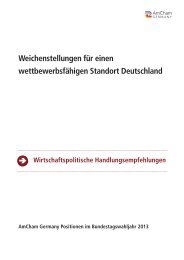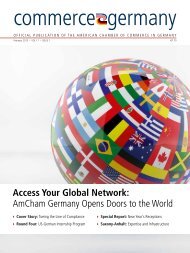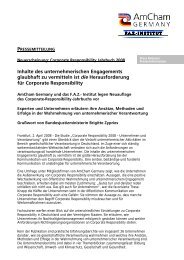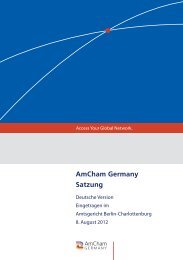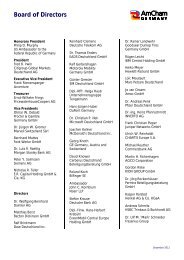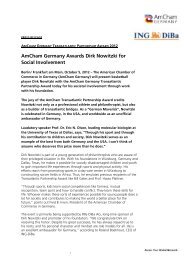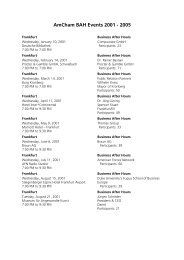Issue 4 - AmCham Germany
Issue 4 - AmCham Germany
Issue 4 - AmCham Germany
You also want an ePaper? Increase the reach of your titles
YUMPU automatically turns print PDFs into web optimized ePapers that Google loves.
amcham germany viewpoint<br />
Our ambitious transportation<br />
goals require an equally<br />
ambitious vision<br />
Smarter Transportation<br />
for a Greener Future<br />
Nearly all transportation in Europe depends on oil, almost 85% of which is imported. Road<br />
transportation alone accounts for 71% of all carbon dioxide emissions.<br />
As we gradually move toward a resource-efficient economy, it is clear that Europe needs to<br />
modernize and transform its transportation system. We need to develop alternative fuels and<br />
reduce oil dependency; we need to build infrastructures that support innovations; and we need<br />
to do these things in a way that spurs economic growth and industrial leadership.<br />
These ambitious goals require an equally ambitious vision. The European Commission’s transportation<br />
strategy aims for a 60% reduction in CO 2 emissions by 2050. It has set substantive<br />
goals for different modes of transportation, including emission-free city logistics in major urban<br />
centers by 2030 and the phaseout of conventionally fueled vehicles in cities by 2050. It also calls<br />
for the development of aviation fuels with 40% lower CO 2 emissions by 2050 as well as a 40%<br />
reduction in emissions from ships.<br />
The development of innovative and alternative fuels is vital to reaching these targets. But a vicious circle<br />
is at work here: Alternative-fuel vehicles are still too expensive and not enough refueling stations have been<br />
built yet. This has dampened consumer demand, which prevents the vehicles from becoming cheaper and<br />
the refueling stations from being constructed. To break this cycle, the Commission<br />
has proposed the adoption of common EU-wide standards as well as binding targets<br />
for member states to establish a minimum level of infrastructure for clean fuels. This<br />
includes increasing the number of electric charging stations and adopting a uniform<br />
plug for electric cars throughout the entire EU to support e-mobility technologies in<br />
gaining a market foothold. <strong>Germany</strong> currently has about 1,950 stations but hopes to<br />
reach 150,000 by 2020, opening up a market of 1 million electric vehicles.<br />
In urban areas, where a quarter of EU transportation emissions originate, e-mobility is key to radically<br />
changing the way public and private transportation is organized. But it is not only about changing how vehicles<br />
move. E-mobility will also trigger further developments in information and communications technologies<br />
such as intelligent transportation systems (ITS) and smart grids. These technologies will help German and<br />
European industries remain competitive while also improving the country and continent’s environmental<br />
and safety record. For years now the EU has been helping to prepare Europe’s transportation sector for a<br />
low-carbon economy. On top of their potential to improve road safety, reduce congestion and optimize the<br />
use of existing infrastructure, ITS can significantly mitigate the environmental impact of road transportation.<br />
Because of these many benefits, the EU should and will continue to invest in ITS.<br />
Matthias Ruete<br />
Director-General, European Commission<br />
for Mobility and Transport<br />
The Transatlantic Marketplace:<br />
Challenges and Opportunities Beyond 2013<br />
TRANSATLANTIC<br />
Business Conference<br />
Seventh Annual Transatlantic Business Conference<br />
Strategic inspiration and impulses for the economic and political partnership<br />
Nov. 13-14, 2013<br />
Commerzbank Tower, Frankfurt/Main<br />
Hilton Frankfurt Airport, Frankfurt/Main<br />
ORGANIZERS<br />
IN COOPERATION WITH<br />
PARTNERS<br />
CO-ORGANIZERS<br />
MEDIA PARTNERS<br />
Additional Information:<br />
Dr. Meghan Davis, F.A.Z.-Institut, Frankenallee 68-72, D-60327 Frankfurt/M., T +49 69 7591-2262, E m.davis@faz-institut.de<br />
www.transatlantic-marketplace.com



